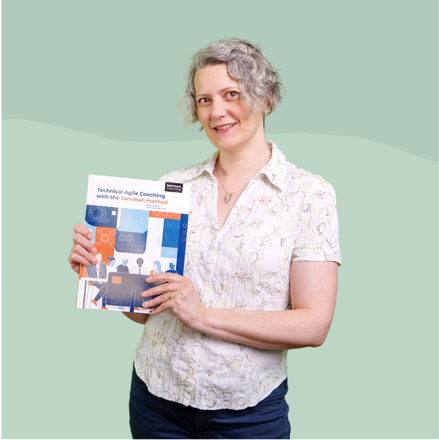Last week I met Woody Zuill when he came to Göteborg to give a workshop about Mob Programming. At first glance mobbing seems really innefficient. You have a whole team of maybe 6-7 people sitting together all day, every day, programming at one computer. How could that possibly be a productive way to work?
I’m pretty intrigued by the idea. It reminds me of the reaction people had to eXtreme Programming when they first heard about it back in like 2000. Is it just an off-putting name for something that could actually be quite brilliant? There are certainly some interesting people who I respect, talking warmly about it. The thing is, when it comes to working together with others, programming at one computer, I’ve had some mixed results. Sometimes good, sometimes less good.
I’ve done some pair programming, and found it worked well with some people and not others. It’s generally worked much better when I’ve paired with someone who has a lot of useful knowledge that I’ve lacked. Either about the language and frameworks we’re using, or about how the software will be used – ie the problem domain. I’ve found it’s worked a lot less well in other situations, with other people. I find it all too easy to hog the keyboard, basically. So I do pair, but not that often.
With ‘Randori’ style coding dojos, the idea is that you have a pair at the front who code, and switch one person every 5-7 minutes, or every test case. I’ve facilitated a lot of these sessions, and I find them especially useful for quickly getting a group of people new to TDD all up and running and pointed in the same direction. Recently I’ve been doing it only for the first session or two, instead having everyone working in pairs most of the time. As a facilitator, this is far easier to handle – much less stressful. Managing the interactions in a bigger group is difficult, both to keep the discussions on track, answer questions about the exercise, and to maintain the pair switching. I also find the person at the keyboard easily gets stressed and intimidated by having everyone watching them, and often writes worse code than they are capable of. So I do facilitate whole-group Randori sessions, but not that often.
So I wanted to find out if mob programming had similar strengths and weaknesses. In what situations does it excel, and when are you better off pairing or working alone? Would I find it stressful, like a Randori? Would I want to drive most of the time, as in pair programming?
Woody turns out to be a really gentle person, about as far away from a ‘hard sell’ as you can get. He facilitaed the session masterfully, mixing theory and practice, telling us stories about what he’s found to work and why. I am confident he knows a lot about software development in general, mob programming in particular, and he is very humble about it.
The most important insight I gained from the session, was that I need to get good at ‘strong-style pairing’. That seems to me to be at the heart of what makes Mob programming work, and not be stressful like the Randori sessions I’ve been doing. I think it will also help me to get pair programming to work well in a wider variety of situations.
I have heard about ‘strong-style pairing’ before, from Llewellyn Falco, who invented it, but I havn’t really experienced it very much before, or understood how important it is. Do go read his blog post about it, for a fuller explanation of what I’m talking about.
The basic idea is “For an idea to go from your head into the computer it MUST go through someone else’s hands”. That forces you to express your ideas really clearly, in words, first. That is actually pretty difficult when you havn’t done it much before. The thing is, that if you do that, then you open up your programming ideas for discussion, critique, and improvement, in a way that doesn’t happen if they go straight from your head through your own hands into the computer. I think if I get better at ‘strong-style pairing’ it will help me not only with Mob programming, but also with pairing and facilitating Randori dojo sessions. Probably also with programming generally.
Pairing has worked best for me when I’ve been driving, and my navigator is good at expressing ideas for me to understand and then type. I think I need to get good at that navigator role for the times when I’m the one with more ideas. I need to learn that when I think ‘I have an idea about to solve this problem!’ I should hand over the keyboard, not grab it. I need to learn to express my coding ideas verbally. Then I will be able to pair productively with a wider range of people.
Randori sessions are much less stressful if the driver has less to do. If the responsibility is shared more evenly with the Navigator, then I think everyone will write better code. As a facilitator, I have less group dynamics to worry about if the designated navigator is in control, and everyone else talks less. (Woody advised that, at least at first, you should ban anyone else in the mob from giving the Driver ideas about what to type, so the Navigator learns the role.)
So thanks, Woody, for taking the time to come to Göteborg, sharing your experiences and facilitating a great workshop. I learnt a lot, and I think Mob Programming and Strong-style pairing could quite possibly be some of those brilliant ideas that change the way I write code, for the better.







